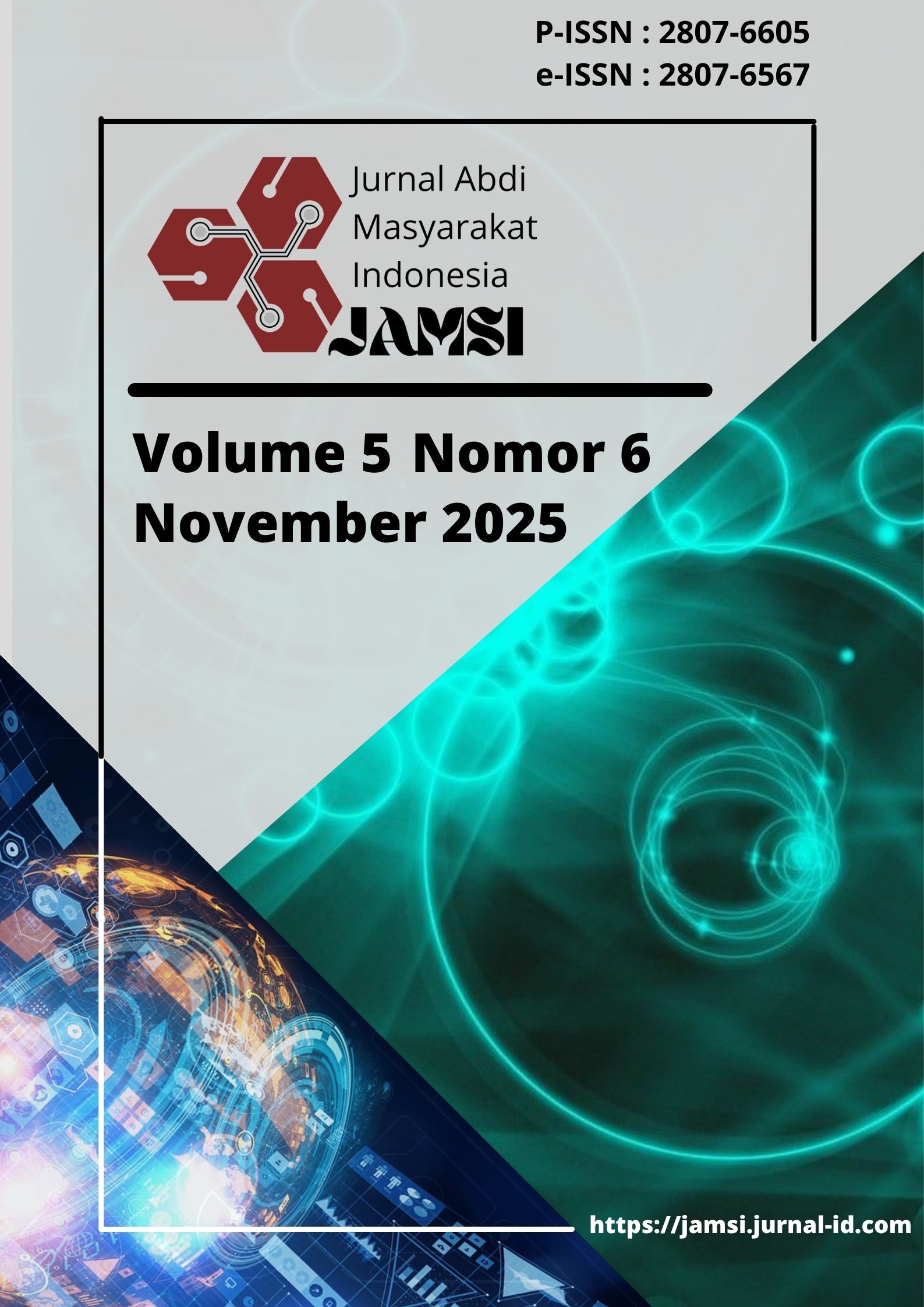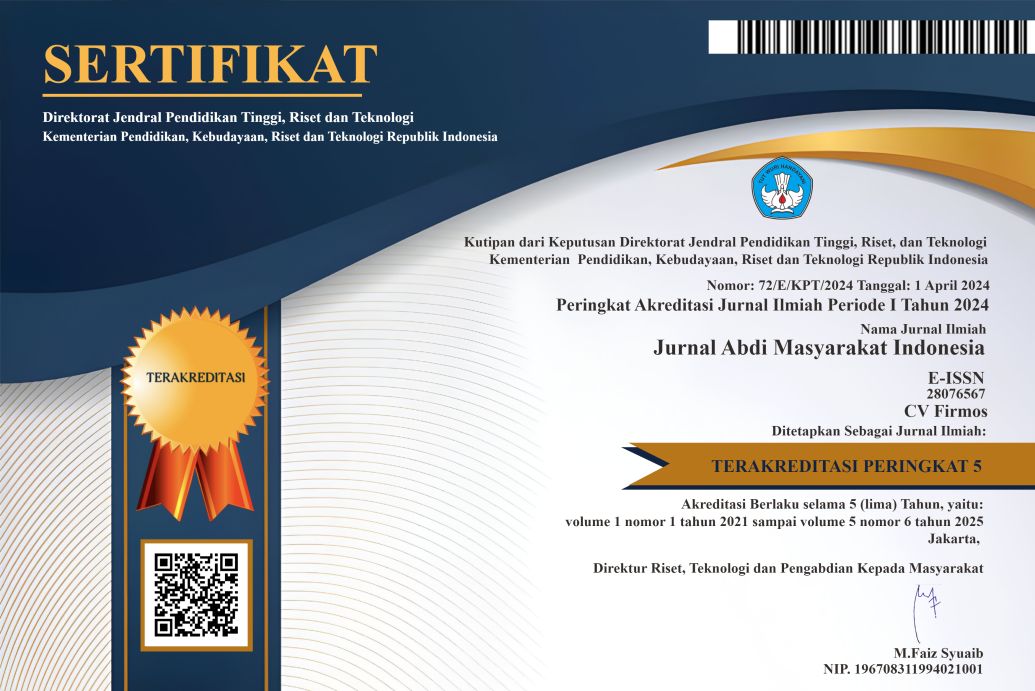Peningkatan Kualitas Administrasi Pendidikan melalui Implementasi Sistem Edu Berbasis ERP di SMP IT Insan Mulia Surakarta, Jawa Tengah
DOI:
https://doi.org/10.54082/jamsi.2130Kata Kunci:
Bank Soal, Efisiensi Administrasi, Pembayaran Digital, Sistem Informasi SekolahAbstrak
SMP Islam Insan Mulia Surakarta-Jawa Tengah, mengalami kendala administrasi akibat sistem manualnya, terutama dalam penerimaan siswa baru (PPDB), pencatatan pembayaran, dan pengelolaan bank soal. Kendala-kendala ini menyebabkan keterlambatan, kesalahan, dan inefisiensi, sehingga membatasi kualitas layanan. Untuk mengatasi hal ini, dalam program pengabdian masyarakat kami mengimplementasikan sistem EDU berbasis ERP sebagai solusi terintegrasi. Sistem ini menggunakan model waterfall untuk analisis, perancangan, implementasi, pelatihan, dan pengujian yang diterapkan selama tiga bulan. Tiga modul diimplementasikan: PPDB, pembayaran, dan bank soal, yang diuji coba kepada 23 peserta. Evaluasi menunjukkan hasil positif dengan efisiensi (4,08), efektivitas (4,08), dampak (4,38), kepuasan (4,28), dan kemudahan penggunaan (4,17) pada rentang skala 1-5. Program pengabdian ini tidak hanya menyelesaikan kendala administratif di SMP Islam Insan Mulia Surakarta, tetapi juga menghadirkan model implementasi sistem informasi berbasis ERP yang dapat direplikasi di sekolah lain. Digitalisasi administrasi melalui modul PPDB, pembayaran, dan bank soal terbukti meningkatkan efisiensi, transparansi, dan profesionalisme tata kelola pendidikan secara umum.
Referensi
Akbarpour, M., Kapor, A., Neilson, C., van Dijk, W., & Zimmerman, S. (2022). Centralized School choice with unequal outside options. Journal of Public Economics, 210, 104644. https://doi.org/10.1016/j.jpubeco.2022.104644
Hendrawan, J., Perwitasari, I. D., Hasyyati, Z., & Hasanah, D. S. (2024). Model UML Sistem Informasi Monitoring Pembayaran SPP Siswa SMA Negeri 1 Binjai. Jurnal Minfo Polgan, 13(2). https://doi.org/10.33395/jmp.v13i2.14270
Hyzy, M., Bond, R., Mulvenna, M., Bai, L., Dix, A., Leigh, S., & Hunt, S. (2022). System Usability Scale Benchmarking for Digital Health Apps: Meta-analysis. JMIR MHealth and UHealth, 10(8), e37290. https://doi.org/10.2196/37290
Indriani, L., & Jatmiko, A. R. (2024). User Satisfaction Analysis of PPDB Online Website with the Application of Webqual 4.0 and Science Methods (Study of SMK Negeri 1 Labuan Bajo). J-INTECH, 12(2). https://doi.org/10.32664/j-intech.v12i02.1282
Islam, M., Tamanna, A. K., & Islam, S. (2024). The path to cashless transaction: A study of user intention and attitudes towards quick response mobile payments. Heliyon, 10(15), e35302. https://doi.org/10.1016/j.heliyon.2024.e35302
Kaindaneh, S. M., & others. (2024). Education management information system with advanced technology. AIP Conference Proceedings, 3220(1), 20004. https://doi.org/10.1063/5.0201737
Khando, K., Islam, M. S., & Gao, S. (2023). The Emerging Technologies of Digital Payments and Associated Challenges: A Systematic Literature Review. Future Internet, 15(1), 21. https://doi.org/10.3390/fi15010021
Konabi, F., Ma’ruf, A., Mar’atussholihah, A., Hidayatur Rahmah, N., & Zaid Fadholah ’Ubaid, M. (2024). Penerapan Sistem Manajemen Ujian untuk Meningkatkan Efisiensi dan Efektivitas Penilaian Kompetensi di SMA Al Islam 1 Surakarta. PANDU: Jurnal Pendidikan Anak Dan Pendidikan Umum, 2(3), 76–82. https://doi.org/10.59966/pandu.v2i3.1072
Lestari, J. A., Andriyanto, S., & Rindri, Y. A. (2024). Sistem Informasi Pembayaran SPP Siswa Terintegrasi WhatsApp Gateway di MA Nurul Falah. Jurnal Teknologi Dan Informasi (JATI), 14(2), 99. https://doi.org/10.34010/jati.v14i2
Lincove, J. A., & Valant, J. (2024). The Effects of Unified School Enrollment Systems on School Demographics and Outcomes: Evidence From New Orleans’ Transition to a Centralized School Lottery. American Educational Research Journal, 61(4), 647–686. https://doi.org/10.3102/00028312241248513
Ly, R., & Ly, B. (2024). Digital payment systems in an emerging economy. Computers in Human Behavior Reports, 16, 100517. https://doi.org/10.1016/j.chbr.2024.100517
Muhartono, D. S. (2024). Policy Model of Zoning System in the Admission of New Students and Their Prospects in Indonesia. Journal Corner of Education, Linguistics, and Literature, 4(001), 545–557. https://doi.org/10.54012/jcell.v4i001.433
Mulia, S. I. (2025). SMPIT Insan Mulia Pati. https://www.smpitinsanmulia.sch.id/
Santoso, H. B., Schrepp, M., Hasani, L. M., Fitriansyah, R., & Setyanto, A. (2022). The use of User Experience Questionnaire Plus (UEQ+) for cross-cultural UX research: evaluating Zoom and Learn Quran Tajwid as online learning tools. Heliyon, 8(11), e11748. https://doi.org/10.1016/j.heliyon.2022.e11748
Saravanos, A., & Curinga, M. X. (2023). Simulating the Software Development Lifecycle: The Waterfall Model. Applied System Innovation, 6(6), 108. https://doi.org/10.3390/asi6060108
Sommerville, I. (2016). Software Engineering. Pearson.
Székely, B., Késmárki-Gally, S. E., & Lakner, Z. (2025). Hybrid project management: Scoping review. Project Leadership and Society, 6, 100182. https://doi.org/10.1016/j.plas.2025.100182
Timotheou, S., Miliou, O., Dimitriadis, Y., Sobrino, S. V., Giannoutsou, N., Cachia, R., Monés, A. M., & Ioannou, A. (2023). Impacts of digital technologies on education and factors influencing schools’ digital capacity and transformation: A literature review. Education and Information Technologies, 28(6), 6695–6726. https://doi.org/10.1007/s10639-022-11431-8
Ula, M., Maryana, Zuraida, Agusniar, C., Malasyi, S., & Saptari, M. A. (2025). Penerapan Aplikasi Pengembangan Bank Soal Berbasis TPACK pada Siswa Sekolah Menengah Atas. Jurnal Malikussaleh Mengabdi, 4(1), 93–100. https://doi.org/10.29103/jmm.v4n1.22074
Xu, Z., & Dang, Y. (2023). Data-driven causal knowledge graph construction for root cause analysis in quality problem solving. International Journal of Production Research, 61(10), 3227–3245. https://doi.org/10.1080/00207543.2022.2078748
Yang, M., Al Mamun, A., Mohiuddin, M., Nawi, N. C., & Zainol, N. R. (2021). Cashless transactions: A study on intention and adoption of e-wallets. Sustainability (Switzerland), 13(2), 1–18. https://doi.org/10.3390/su13020831
Unduhan
Diterbitkan
Cara Mengutip
Terbitan
Bagian
Lisensi
Hak Cipta (c) 2025 Bambang Widoyono, Ristu Saptono; Arif Rohmadi, Akhmad Syaifuddin, Brilyan Hendra, Rizal Dwi Anggoro; Muhammad Syafiq Ibrahim

Artikel ini berlisensi Creative Commons Attribution 4.0 International License.


















